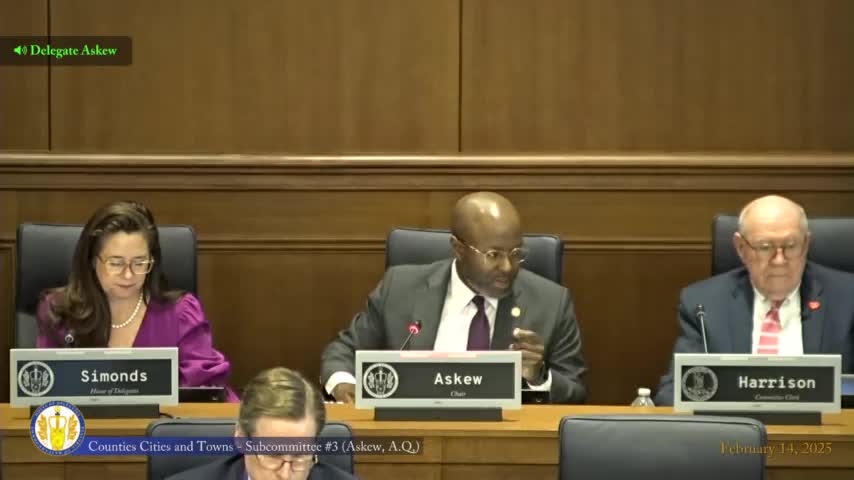Panel puts SB 1305 on hold after landowners describe sudden tax spikes during rezoning appeals
Get AI-powered insights, summaries, and transcripts
Subscribe
Summary
A subcommittee gently laid SB 1305 on the table after landowners testified that Prince William County taxed properties at higher post‑rezoning rates while rezoning decisions were under appeal. The substitute narrowed the bill to Planning District 8; the subcommittee voted 6–2 to table the bill and ask the Department of Taxation for guidance.
SB 1305, a measure by Sen. McPike that would clarify when real‑estate taxation should reflect a change in zoning, was laid on the table by a 6–2 vote after multiple landowners described steep tax increases while rezoning decisions remained in litigation.
The bill’s sponsor, Sen. McPike, told the subcommittee the legislation “seeks to ensure fairness, in equal application regarding laws of taxation in real estate when they're pending rezoning reclassification.” He said the bill responds to a circuit court ruling and would, in the substitute before the committee, limit its scope to Planning District 8.
The issue arose from a recent set of assessments in Prince William County, where several property owners told the subcommittee their tax bills rose dramatically after the county applied post‑rezoning valuations even while rezoning approvals were under appeal. T. George Underwood, a landowner who testified in person, said many of the affected owners are retired farmers and that some are “land rich but cash poor.” John Brower, another owner, told the panel his six‑month tax bill rose from $2,673 to $728,175 after the county applied the higher valuation. A separate witness said a family’s annual taxes went from about $12,000 to over $40,000 and that their mortgage servicer warned monthly payments could jump by “more than 4 or $5,000 a month.”
Supporters asked the General Assembly to define whether taxation should attach at the moment a locality approves a rezoning or only after the rezoning becomes final following appeals. McPike told the committee the current code is silent and that valuation should reflect actual use: “land valuation is driven by its use,” he said. The substitute version before the panel would limit the bill to Planning District 8 and would allow the county to collect taxes only after resolution of pending appeals or court cases, according to McPike.
Committee members raised procedural concerns. One member asked whether the bill might “incentivize continued litigation to avoid having the rezoning…pay the taxes,” and McPike said an earlier provision that mentioned sale of the subject property had been deleted from the substitute. Another member asked whether Prince William County already has authority to pause levying a tax while appeals proceed; McPike and other speakers said practices vary by locality and that some localities put an assessment into an appeal status until the matter is resolved.
The substitute to narrow the bill to Planning District 8 was moved and accepted by voice vote earlier in the hearing. Later, a member moved to lay SB 1305 on the table and request guidance from the Virginia Department of Taxation. The motion carried 6–2; the clerk recorded the vote as 6 in favor, 2 opposed. The committee indicated it may revisit the matter next year after receiving input from the department.
Supporters said the bill would clarify an ambiguity in state law and prevent what they called abrupt, punitive tax bills while rezoning litigation is pending. Opponents did not appear in the room; one person participated online but identified herself as a property owner who supported the bill. The subcommittee also heard that a circuit court had considered tax issues arising from the rezoning but concluded the statute did not clearly state when taxation should change.
With the motion to table approved, SB 1305 will not advance from the subcommittee at this time; the panel asked the chair to send a letter to the Department of Taxation asking for clarification that could inform changes to the code.
